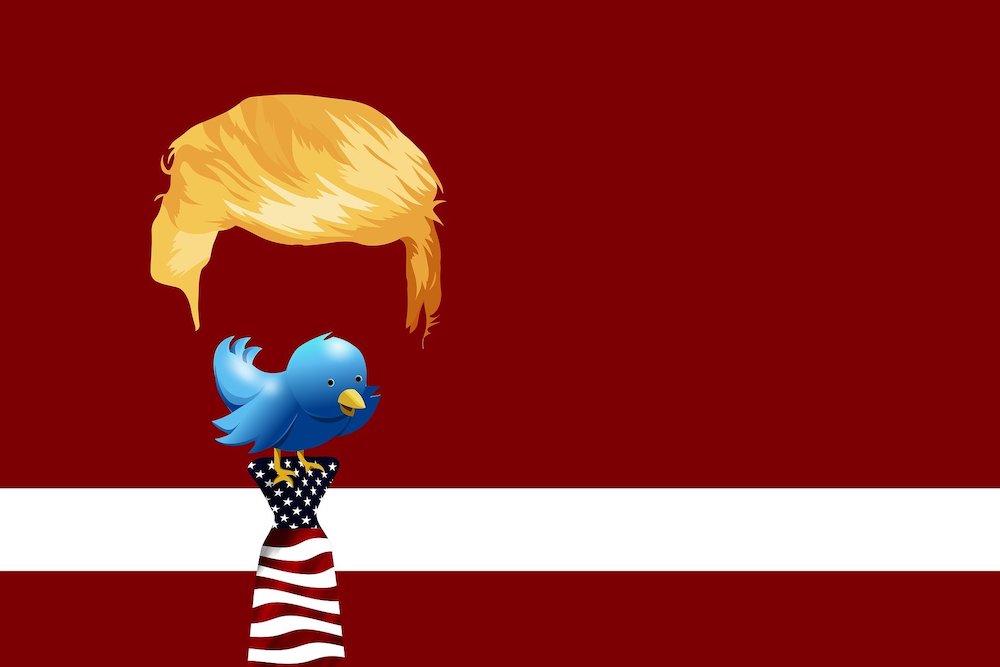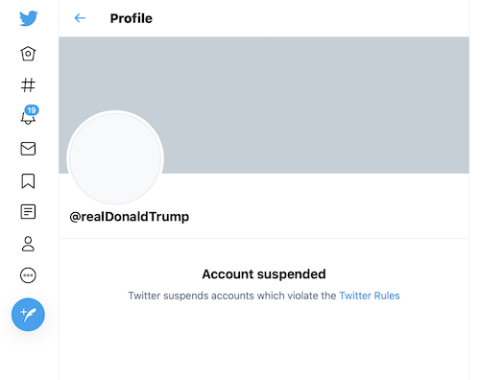
Twitter permanently banned Donald Trump from its platform Jan. 8, 2021. (Pixabay/geralt)
I've recently been reading Arkady Ostrovsky's The Invention of Russia, a history of today's Russia extending back through the Bolshevik Revolution. A major theme of the book is that "whoever controlled the media also controlled the country." The heroes of this complicated history of advances and retreats are those who stood for truth.
As Ostrovsky highlights for us, "Alexander Solzhenitsyn, who wrestled with the Soviet System, knew there was only one way to defeat it: 'Live not by lies,' he wrote on the day of his arrest."
A Catholic reader might be taken back immediately to our Lord's dramatic confrontation with the representative of highest earthly power on the day of his arrest, Pontius Pilate, who asked him, "What is truth?"
Recent events in the United States have shocked us all into the realization that Pilate's question is a most urgent and salient one for our political community. Of course, the nation is more than a political community in any narrow sense: It's a collection of institutions, neighborhoods and friendships — communities within community. And the riot at the Capitol was dispiriting evidence that our community is broken, in large part because we do not share a common narrative about who we now are and who we are becoming — not in an existential sense of our spiritual journey (though that, too), but in the basic sense of who won the states of Wisconsin, Pennsylvania and Georgia back in November.
A striking response to the events of Jan. 6 was the decision of Twitter to remove then-President Donald Trump from its platform permanently. This step was understandably disturbing to many people, including many who do not align themselves with Trump. Social media platforms have come to play such a central role in our lives, especially with so many of us spending nearly all our time in our homes and unable to interact in ordinary ways, that even if we know Twitter is not bound by the First Amendment, it seemed as if something might be happening to our freedom of speech.
Advertisement
Without question, there are serious and complicated issues involved in how social media might improve or distort our common conversation, nationally and globally. Jon Askonas and Ari Schulman have thoughtfully considered many of these questions in arguing that such platforms "can never escape politics." But those worries and complications can wait for another day — the removal of Donald Trump from Twitter was long overdue.
As a priest, I do not endorse parties or candidates, and I have maintained that practice in both of Trump's elections. I understand that faithful pro-life Catholics in many cases felt bound to vote for him, and I do not question their reason or character here. But whether Trump should have been elected or re-elected is a separate matter from whether his contributions to Twitter should have been allowed, and here there was not difficult issue.
Catholics are committed to fundamental freedoms, and that commitment flows from our anthropology: We see the human person as oriented toward the truth. For this reason, St. John Paul II wrote in Centesimus Annus, discussing core freedoms in democratic society and doubtless reflecting upon his own experience of Soviet oppression, of "the right to develop one's intelligence and freedom in seeking and knowing the truth."
But just as the freedom flows from our orientation toward truth, so it must be shaped by it. Twitter has a freedom to host a conversation, and a further freedom (itself subject to abuse, of course) to structure the conversation it hosts toward the truth. We would rightly say that was an obligation — morally though not legally.
When we understand that whether a private platform such as Twitter is not bound by any obvious legal bar to removing someone from participation, it quickly becomes apparent that if it is trying to moderate conversation in a spirit of human freedom it ought to consider its role in our common pursuit of truth. And here the evidence is abundant that Trump did not aid people in coming to the truth, but systematically misled them.

Twitter's placeholder for @realDonaldTrump account that was used by former-President Donald Trump (NCR screenshot)
In just the two weeks after the election, The New York Times persuasively reported that he had tweeted some 300 false tweets about election fraud. Studies from before and after the election show that Trump had managed to create for his millions of followers a demonstrably false alternate reality, and that his removal has already dramatically decreased the presence of such misinformation in the Twitter conversation. It doesn't take complicated studies to realize that when millions apparently believe the election was stolen despite the laughable failure of every attempt to prove this in courts of law, even before judges appointed by Trump himself, the misinformation has taken root.
If the right to free speech is, as we Catholics understand it, a natural implication of our orientation toward the truth, then it is uncomplicated that a private entity like Twitter, which invites people to join one another in conversation, is entitled to remove from that conversation one who serially and systematically misleads millions from a perch of high institutional authority.
Put more simply, the fact that Trump was president of the United States made him uniquely appropriate for content moderation, and legitimately held to a higher standard than you or I would be. And, of course, he was held to no such standard until it was, tragically, too late.
Trump's tweets didn't just mislead millions for years, though that is perhaps the easiest way to see why this decision was not only not disturbing but eminently correct, but he also threatened the common good in other ways. As the commander in chief of the world's most powerful military, he more than once threatened, in tweets, massive military action in ways that were frightening to many and destabilizing for all. In 2018, he tweeted the following (capitalization is from the original):
To Iranian President Rouhani: NEVER, EVER THREATEN THE UNITED STATES AGAIN OR YOU WILL SUFFER CONSEQUENCES THE LIKES OF WHICH FEW THROUGHOUT HISTORY HAVE EVER SUFFERED BEFORE. WE ARE NO LONGER A COUNTRY THAT WILL STAND FOR YOUR DEMENTED WORDS OF VIOLENCE & DEATH. BE CAUTIOUS!"
Some have criticized Twitter for hypocrisy precisely for allowing Iran's president, who himself has tweeted incendiary messages in the past, to remain while removing the U.S. president. I may be old fashioned, but, "Why take the president of the U.S. away when you allow this other dictator to stay," strikes me as a sad defense of the putative leader of the free world.
As we consider social media and the common good going forward, the lesson to take from Donald Trump's removal from Twitter is not that it was a mistake in light of principles of free speech, but that it came far too late to save millions from delusion, and to save five people from dying in a sad, farcical attempt to overturn an election.
We who are followers of the one who told Pilate, "For this I was born and for this I came into the world, to testify to the truth. Everyone who belongs to the truth listens to my voice," must reflect on how we've sought the truth, and helped others to do so. Any healing or rebuilding to come will not be achieved if we live by lies.







